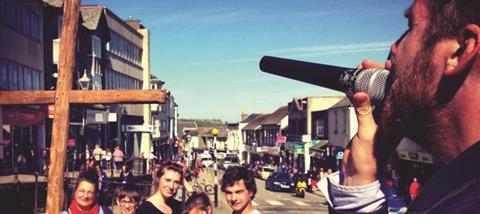
You can’t escape them.
From the simpering Jehovah’s Witnesses to the exotic Muslims to the dancing pentecostals, a Saturday amble down my local high street brings you into contact with a frenetic spectrum of street preachers.
Whether Croydon’s street preachers sing it, shout it, or shamefacedly distribute it via pamphlet, each of them is presenting and asserting a worldview that is wildly divergent from the other, and each is equally convinced of its own rectitude.
While I quite enjoy running the gauntlet of religions on my way to Marks & Spencer, it turns out that not everyone is fan.
People dislike street preachers. It was the Croydon Advertiser’s recent debate about the ‘confrontational’ nature of street preaching that reminded me of this.
Apparently, not only are they a threat to our eardrums and our sensibilities, but also our children, too. ‘Hey kids, don’t do drugs or tracts‘.
Of course it’s not really a surprise. Nobody likes to be told that God exists, and it’s not them. Nobody likes to hear that all those chemsex parties may have eternal consequences. Nobody likes to consider that their lives are short, devoid of objective meaning, and will one day cease – most likely painfully, in an NHS bed, with formerly estranged children arguing over the will.
The piercing truth of the Gospel is certainly a lot to take in when all you popped out for was a pint of semi-skimmed.
The first thing to realise is that – pending a Brexit-induced pogrom on proselytisers – street preachers aren’t going anywhere anytime soon. Despite an increasing intolerance to differing sexual ethics, a culture of near-constant victimhood, and nebulous definitions of ‘hate speech’, government legislation still deems street preaching a legitimate activity in the public realm.
Far from a societal menace, street preachers present a rare opportunity for us to experience a plurality of ideas that we are otherwise insulated from.
If you want diversity and immigration, then you should expect the religious ideas and ideals that come with it. Hassan, aged 35, who has travelled from Saudi Arabia, is not going to suddenly deny after three decades of inculcation that ‘He is Allah, the One, Allah the eternally besought’, just because his host society has acquiesced to a postwar orthodoxy of secular materialism and cultural marxism. Nor will Grace, the Namibian coptic, nor Alan, the Scientologist from Australia, renounce their own beliefs.
If they’re right, then nothing is more important than what they have to say. Consider for a moment that what any one of those street preachers is saying is not merely the deluded ramblings of an imbecile, but is actually correct. If so, then we’re dealing with issues of life and [life after] death, and not simply a trifling temporal inconvenience.
Remove the street preachers from Croydon High Street (or any other high street) and you’re left with the meat and Mammon of British life. A grey corridor of young mothers shouting at recalcitrant children, hostile clod-footed teens shambling in packs, and sickly men selling bits of wire jewellery. It’s not a good look.
Croydon High Street is a marketplace – and I’m glad that thanks to street preachers it’s a marketplace of ideas as well as products.
Jonny Rose is the founder of Croydon Tech City and fashion label Croydon Vs The World. He writes here in a personal capacity.




























